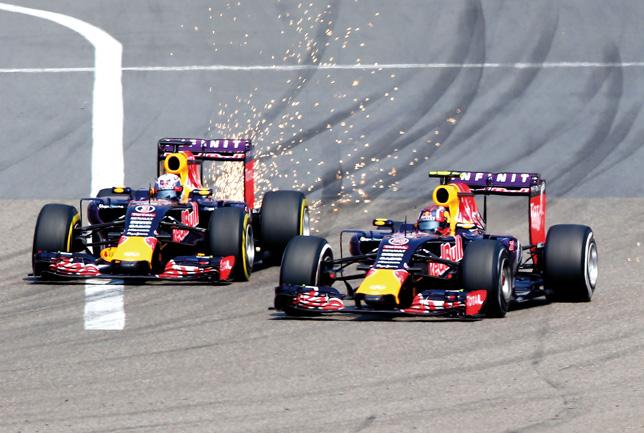
The Chinese Grand Prix was another race to forget for Red Bull. In the aftermath, the former dominant team of Formula 1 were left languishing in fifth place in the constructors’ championship.
– Mercedes’ Rosberg accuses Hamilton of selfishness at China GP
– Porsche driver Karim Al Azhari crowned TRD 86 Cup champion
– Mercedes’ Hamilton wins Chinese Grand Prix and second win of year
For Daniil Kvyat, it ended with a puff of smoke early in the race, a succinct finale to what had been a troubled weekend for the Russian.
Brake issues had bedevilled his practice runs and then a problem with the Renault power unit scuppered his chances of qualifying better than 12th.
Then there was the matter of Daniel Ricciardo, who stuttered off the start line and then spent the rest of the race playing catch-up before sneaking into the points in ninth place.
Red Bull had their issues last season after a truly woeful winter testing but they turned things around in some style for Ricciardo to win three grands prix and, for a time, ensure the championship battle was not solely a one-team affair. In addition, they held off the threat of Williams to finish second in the constructors’ championship.
A year on and three races into the season, they have a mere 13 points and tellingly find themselves a solitary point ahead of their ‘B’ team Toro Rosso in the standings.
Daniel’s post #ChineseGP thoughts. Full report and Team Reaction: http://t.co/uyEriaSUiN #F1 pic.twitter.com/4h5fxtJxjO
— Red Bull Racing (@redbullracing) April 12, 2015
So what then has gone so wrong? The biggest issue lies with the Renault engine that powered the team so brilliantly in its recent heyday. As Renault F1 managing director Cyril Abiteboul put it: “A race-winning engine on merit is not something that is going to happen this year, we know that.”
Red Bull themselves have made no secret of their displeasure with the lack of power from the Renault engine, with both Christian Horner and Adrian Newey being very scathing in their public assessment of where things currently stand.
So why has that impacted Red Bull so much more than Toro Rosso despite the fact the two teams have the same power unit packaged into their car?
A Formula 1 car is ludicrously complex and the machinations of Red Bull’s in contrast to its sister team means that the knock-on effect of Renault’s stuttering engine has had an even greater negative impact.
Red Bull have complained that every facet of the car’s performance has been compromised as a result: corner entry and exit, tyre degradation, slip control of the tyre, the list goes on.

The domino effect has had the team constantly trying to compensate by moving around its brake balance, which has then merely thrown up further issues, a loss of temperature in the brakes and then tyres not working to their optimum. Horner has labelled it a “spiralling effect”.
So how do they go about finding a solution? Renault clearly needs to get a better engine and is working to do so but feels that, under the constraints of the FIA rules for this season, it is unable to make the monster strides it so desperately needs.
It has led to both Renault and Red Bull to threaten to quit the sport altogether although it’s hard to say just how realistic such threats are.
Renault’s seems the more serious. It is constantly being blamed for Red Bull’s issues and such negative publicity is not going to help the sale of its road cars, which is its overriding business after all.
As for Red Bull, the team have threatened to walk away twice this season already, team owner Dietrich Mateschitz saying so as recently as last Friday.
His gripe is this: “We’ll only stay in Formula 1 if we have a competitive team and we need a competitive power unit for that.”
He is in no uncertain terms saying to the rule makers: ‘change the engine rules or we walk.’
Mateschitz is a ruthless businessman and has been known to pull the plug with Red Bull in other areas of business when he no longer sees the market value of something. His thinking is that, if F1 is no longer having the effect he wants from his brand then it’s game over.
Red Bull won’t, for example, start making its own engines as that’s not its line of business and it’s too costly to start down that route.
Post race quote from @Dany_Kvyat. Full #ChineseGP Race Report and Team Reaction: http://t.co/uyEriaSUiN pic.twitter.com/Vtphb2XlV3
— Red Bull Racing (@redbullracing) April 12, 2015
But F1’s global appeal is huge, Mateschitz knows it and he’ll be hard pressed to find a better avenue to market Red Bull.
Plus there is the fact that financially the team have done well out of the sport with the deal it has with the sport’s money makers. And there was the slightly puzzling issue of having signed up a long-term partner in Hisense this week hardly something the Chinese giant would have done if Red Bull were about to walk away.
The point is that Red Bull have huge clout in F1 and that Mateschitz’s interest has waned in this latest era of the sport.
That will have people worried but Red Bull have the wherewithal to turn things around. That may not come this season with Mercedes still shining and Ferrari having proved resurgent. But they are here to stay… for now, and are too good not to make a comeback.